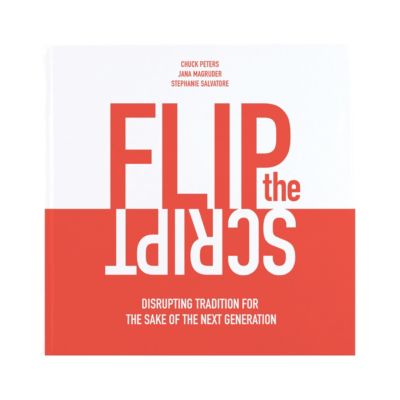
We can’t lament the increased secularization of communities while assuming a ministry model designed for Christian culture will be effective.
By Scott McConnell
As Christians, we are noticing religious attitudes and beliefs changing in our country and local communities. As individuals and as church leaders, we must adjust our ministry model accordingly.
We cannot continue to lament that our communities are becoming more secular while assuming a ministry model designed for a predominantly Christian culture will effectively reach them.
In their book, Flip the Script: Disrupting Tradition for the Sake of the Next Generation, Chuck Peters, Jana Magruder, and Stephanie Salvatore present the case for making ministry adjustments specifically in kids and student ministry because our culture has changed. The kids and students we want to reach will view their first interaction with our churches from a different religious perspective than previous generations.
How can we describe today’s culture?
First, we must acknowledge the religious experience of recent generations is different than prior generations. Fewer than half of Millennial and Gen Z individuals say their families attended religious services weekly or more while growing up. A majority of each previous generation had the experience of attending religious services each week.
“The kids and students we want to reach will view their first interaction with our churches from a different religious perspective than previous generations.” — @smcconn Click To TweetSecond, how people are organizing their beliefs—including their spiritual beliefs—has much less basis in an external source of truth. People are creating their own truth and considering it good. The most recent State of Theology study that Lifeway Research conducted for Ligonier Ministries shows 60% of American adults agree religious belief is a matter of personal opinion, not objective truth. And 66% of Americans agree everyone sins a little, but most people are good by nature.
Flip the Script describes this new landscape in detail and highlights the danger for the next generation. Because each person is expected to create this perspective of truth on their own, this “philosophy of expressive individualism puts tremendous pressure on children,” the authors explain. “Imagine the pressure that comes with defining ‘self,’ rights, and ethics—on kids and students whose brains are not yet fully developed.”
The expectation in our culture is not just that you self-define and have these beliefs or opinions but that expressing this becomes your life. As the book explains, for young people, “that pressure doesn’t end with defining themselves. Once they define themselves by looking within themselves, there is additional pressure to express, defend, find people who celebrate that definition, and reject those who disagree.”
Why adjust your ministry model?
The apostle Paul modeled adjusting his ministry as he traveled to each new city and region on his missionary journeys. He did not share a different truth in each place. But the way he presented the same truth differed based on the cultural context of who he was talking to.
In Pisidian Antioch, Paul appealed to a common heritage, as he sat in the synagogue and addressed fellow Israelites (Acts 13:16). After reminding them of many elements of their common history and relationship with God, he introduced them to the Savior, Jesus, as the descendant of David whom God had promised (Acts 13:23).
In Lystra, Paul saw that a man without strength in his feet had faith to be healed. When he healed the man through God’s power, the people thought their gods had come down in human form. Instead of responding to them by announcing that Zeus and Hermes were false gods, Paul started with their context by first introducing his God, “who made the heaven, the earth, the sea, and everything in them” (Acts 14:15, CSB). Then Paul explained their gods and pointed them to the general revelation of God that had been present the whole time. “In past generations he allowed all the nations to go their own way, although he did not leave himself without a witness, since he did what is good by giving you rain from heaven and fruitful seasons and filling you with food and your hearts with joy” (Acts 14:16-17, CSB).
In Athens, Paul saw the people’s many idols and their love for debate. As he began to engage in debate with them, he had the opportunity to go to the Areopagus, a formal setting for presenting and debating ideas. His address there on Mars Hill again started with their context by introducing them to a deity they called “an Unknown God” (Acts 17:22-31). He introduced this God as the creator who wanted people to seek Him. He quoted one of their poets to highlight the truth that we were made in God’s image so our depiction of God should not be gold, silver, or stone. And then he immediately called them to repent.
“Paul introduced the same God and gave the same call for repentance in each culture. But Paul introduced God contextually, explaining the times and local beliefs from God’s perspective.” — @smcconn Click To TweetPaul introduced the same God and gave the same call for repentance in each culture. But Paul introduced God contextually, explaining the times and local beliefs from God’s perspective. If we seek to share the truth of the gospel with no concern for where people are at spiritually, our message will not connect, and we will reveal we do not care enough to understand what people value.
In a Christian culture, caring meant calling people back to the church and the truth that they already knew. In a secular culture, caring means acknowledging real human needs and hurts we all are experiencing, listening to how people are personally processing those experiences, and sharing God’s perspective on these beliefs and experiences.
How does ministry to kids and students need to change?
Flip the Script summarizes the disconnect between many next-generation ministries and today’s culture. “We’ve approached ministry assuming kids and students have church experience as a starting point,” the authors explain. “Without meaning to, we’ve built a culture we didn’t intend to build that quietly says to kids who do not have a Christian worldview, ‘You don’t belong.’”
In the book, the authors appeal for churches to meet kids and students where they are. They are advocating for churches to minister contextually in the same way the apostle Paul did. The content of the gospel will still be shared, but the unchurched background of families must first be acknowledged.
“The content of the gospel will still be shared, but the unchurched background of families must first be acknowledged.” — @smcconn Click To TweetThis new NextGen ministry model starts by making sure children feel welcomed and included and want to come back. Once they begin to listen, strategies focus on making sure kids and students stay engaged. It is only when leaders assume no prior knowledge of truth that they can share foundational truths that make every child an insider.
“Focusing on belonging and relationships is absolutely critical for kids and students in pre-faith stages,” the authors point out. It is in the context of relationships that the next generation can truly consider the truths of who God is, in much the same way the Greeks considered Paul’s address on Mars Hill.
By spending time intentionally welcoming every student and child who God has created, we are modeling an identity for this generation that is based on the identity God has designed. This will be in sharp contrast to the pressure and angst that a secular society demanding expressive individualism is offering them.
For permission to republish this article, contact Marissa Postell Sullivan.












